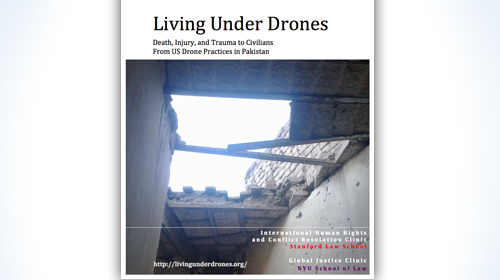NYU–Stanford Report Documents U.S. Government’s False Narrative on Drone Strikes


Today, researchers at the law schools of New York University and Stanford University published an important and comprehensively documented report about the human and strategic costs of the United States’ drone program in Pakistan. The report marshals research based on interviews of victims, witnesses, medical experts, and journalists in Pakistan, and a review of thousands of pages of documents and media reports, to arrive at its chief conclusions:
Far more civilians have been killed by American drone strikes in Pakistan than U.S. officials have been willing to acknowledge;
The government’s use of drones is a source of daily, incessant emotional and psychological terror to Pakistani civilians; and
The drone program has been “damaging and counterproductive” to the United States’ national security by turning the Pakistani public against U.S. policy.
The report, titled “Living Under Drones,” refutes the government’s ongoing attempt to tell a one-sided story to the public about its use of unmanned drones in Pakistan and elsewhere. As the report explains, U.S. officials publicly describe the drone program “in terms of its unprecedented ability to ‘distinguish . . . effectively between an al Qaeda terrorist and innocent civilians,’” and have sought to establish a narrative according to which drones are “capable of conducting strikes with ‘astonishing’ and ‘surgical’ precision.” In the words of the report, and as we have argued and sought to expose, “[t]his narrative is false.”
The report rejects the U. S. government’s claims to the public that there have been few or even “zero collateral deaths” as a result of American drone strikes in Pakistan. (Based on data compiled by the UK’s Bureau of Investigative Journalism, the report estimates that there have been 474 to 884 civilian deaths as a result of drone strikes since 2004, including 176 children.) And equally important, it details many of the unseen and often-unreported costs of the government’s use of drones: “Drones hover twenty-four hours a day over communities in northwest Pakistan, striking homes, vehicles, and public spaces without warning. Their presence terrorizes men, women, and children, giving rise to anxiety and psychological trauma among civilian communities.” (Watch a video about the creation of the report, and some of its findings, below.)


%3Ciframe%20allowfullscreen%3D%22%22%20frameborder%3D%220%22%20height%3D%22274%22%20src%3D%22http%3A%2F%2Fwww.youtube-nocookie.com%2Fembed%2F6yMOzvmgVhc%3Fautoplay%3D1%26version%3D3%22%20width%3D%22480%22%3E%3C%2Fiframe%3E
Privacy statement. This embed will serve content from youtube-nocookie.com.
Please note that by playing this clip You Tube and Google will place a long-term cookie on your computer. Please see You Tube's privacy statement on their website and Google's privacy statement on theirs to learn more. To view the ACLU's privacy statement, click here.
Video by Brave New Foundation.
The report comes a week after the government refused, in a Freedom of Information Act lawsuit brought by the ACLU, to confirm or deny that the CIA’s drone killing program even exists. Last week, we argued to the D.C. Circuit Court of Appeals that the CIA’s secrecy claim is untenable given statements by senior government officials discussing details of the program. As Judge Merrick Garland put it at the oral argument, the government is insisting that “the emperor has clothes, even when the emperor’s boss” has repeatedly acknowledged otherwise.
Both today’s report and our lawsuit make clear that the gap between what the government wants to tell the public about drones and what independent academics, journalists, and researchers have documented has now become a chasm.
Learn more about targeted killing: Sign up for breaking news alerts, follow us on Twitter, and like us on Facebook.

